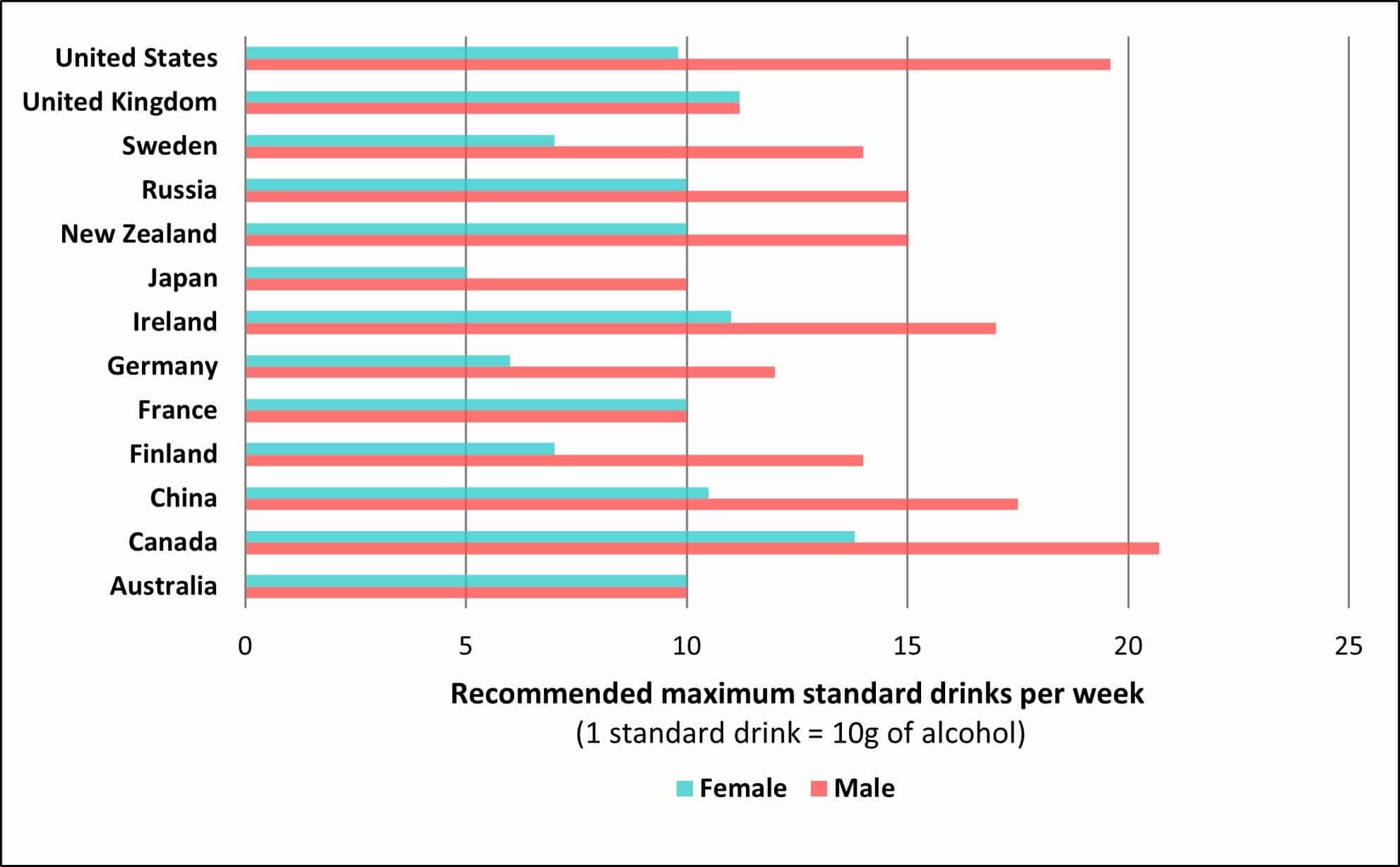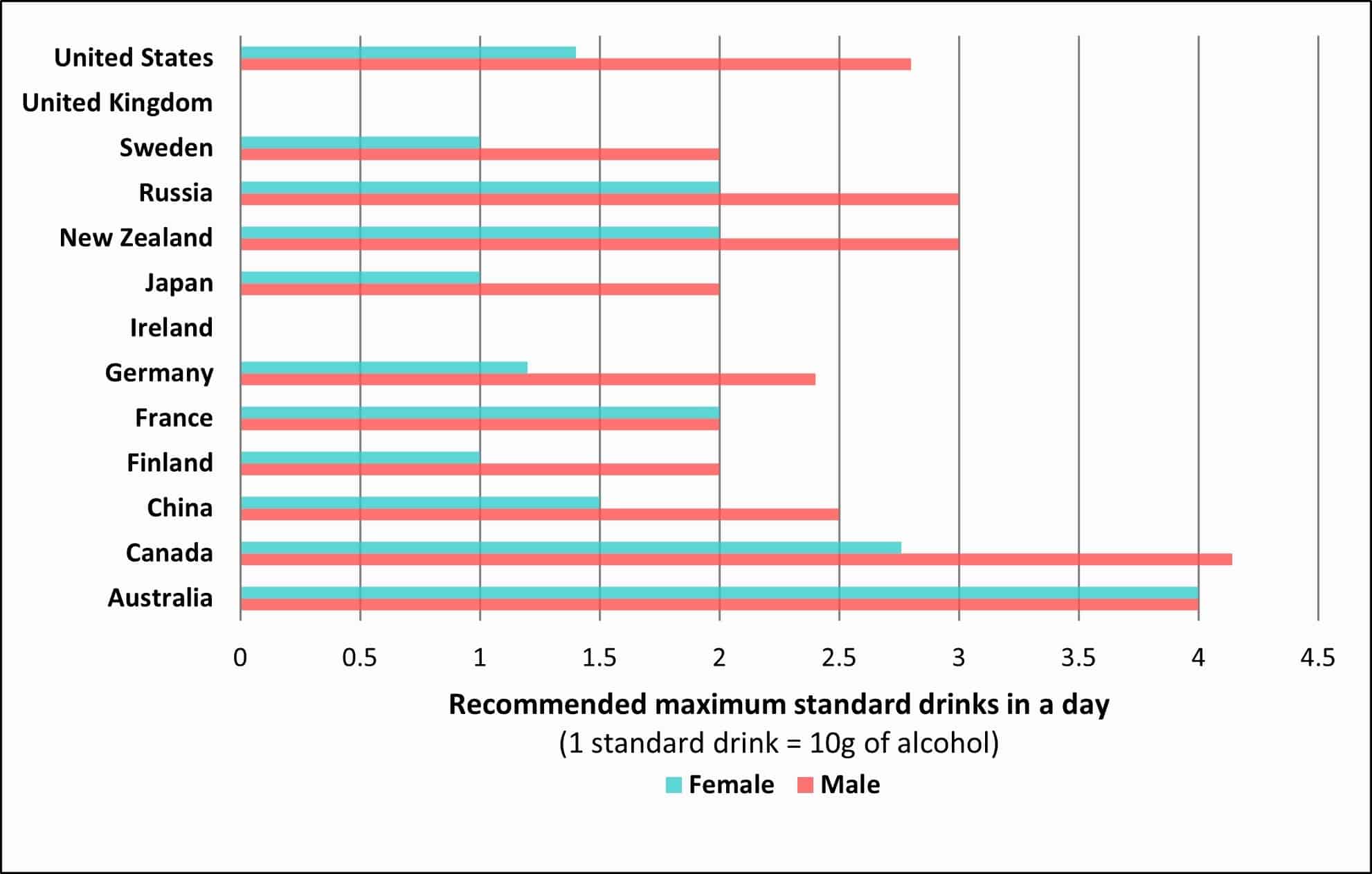Having a drink – one, a few, or many – is a sociocultural norm for many Australians at the tail end of the year. Work parties, celebrations with family and friends, and for the lucky ones, some extended free time or even a holiday all seem to come together with both December-January and a drink.
While obviously not everyone drinks, only around 20% of Australians abstain with over half of this made up of former drinkers (no alcohol in the preceding 12 months).1 Unsurprisingly, being around others who are drinking increases the likelihood that a person will both start drinking themselves and consume more.2
Labelling alcoholic drinks with both a cancer warning,3 and national drinking guidelines,4 appears to improve people’s awareness of health risks, drinking recommendations, and support for alcohol control policies.5
To inform people’s consumption habits and in turn reduce the occurrence of alcohol related health risks, the National Health and Medical Research Council (NHMRC) have updated the 2009 guidelines for the consumption of Alcohol.6 The guidelines recommend that a healthy adult should not consume more than four standard drinks per day, and no more than ten standard drinks per week. This consolidates previous recommendations to reduce short- and long-term harm by providing recommendations around the number of drinks per day rather than per occasion, given people may encounter more than one drinking occasion per day.
Recommendations against consumption for people under 18, or those who are pregnant or breastfeeding have also been stated more explicitly, as there is no evidence suggesting any amount of consumption might be recommended for these groups.

Figure 1: Weekly alcohol consumption recommendations between selected countries
Alcohol consumption guidelines vary by country. Figure 1 shows how the NHMRC’s current guidance compares to the recommended weekly consumption of alcohol in other countries and Figure 2 compares recommended daily consumption noting that the UK and Ireland do not have daily recommendations.7

Figure 2: Maximum daily alcohol consumption recommendations between selected countries
Each year, three million people die due to harmful use of alcohol.8 Alcohol consumption can harm both the drinker and those around them – most frequently female partners and children.9 When asked about the drinker’s consumption habits, the average response from those harmed were five or more drinks four times a week.9 In 2010, the World Health Organization (WHO) endorsed a global strategy to reduce the harmful use of alcohol. Now the WHO has acknowledged that action arising from the strategy has been sluggish and called for faster implementation.10
In relation to the social, economic, and health impacts of the COVID-19 pandemic, which has also amplified stress, mental ill health, isolation, domestic violence, and alcohol use,11 the WHO has urged governments to restrict access to alcohol particularly during lockdowns.12
When South Australia entered a very brief and ultimately abbreviated lockdown on November 19, the State government announced it would close bottle shops only to backtrack two hours later due to concern for people with alcohol addiction. Considering the short-lived, widespread panic buying, clearly we have a very complex, potentially worrying relationship with drinking.
After an undeniably challenging year, however you choose to spend the end of 2020 and the beginning of 2021, please take care of yourself and others and do consider becoming informed and up to date on the latest alcohol consumption guidelines and the short and long term risks of harm related to unsafe drinking. Relax, and stay safe!
References
-
WHO. Australia: Alcohol consumption and patterns. 2019. https://www.who.int/substance_abuse/publications/global_alcohol_report/profiles/en/ (accessed 10 Dec 2020).
-
O’Donnell R, Richardson B, Fuller-Tyszkiewicz M, et al. Ecological momentary assessment of drinking in young adults: An investigation into social context, affect and motives. Addictive behaviors 2019; 98: 106019.
-
Weerasinghe A, Schoueri-Mychasiw N, Vallance K, et al. Improving Knowledge that Alcohol Can Cause Cancer is Associated with Consumer Support for Alcohol Policies: Findings from a Real-World Alcohol Labelling Study. International journal of environmental research and public health 2020; 17(2).
-
Schoueri-Mychasiw N, Weerasinghe A, Vallance K, et al. Examining the Impact of Alcohol Labels on Awareness and Knowledge of National Drinking Guidelines: A Real-World Study in Yukon, Canada. Journal of studies on alcohol and drugs 2020; 81(2): 262-72.
-
Hobin E, Shokar S, Vallance K, et al. Communicating risks to drinkers: testing alcohol labels with a cancer warning and national drinking guidelines in Canada. Canadian journal of public health = Revue canadienne de sante publique 2020; 111(5): 716-25.
-
National Health and Medical Research Council (NHMRC) ARCaUA. Australian Guidelines to Reduce Health Risks from Drinking Alcohol. 2020. https://www.nhmrc.gov.au/about-us/publications/australian-guidelines-reduce-health-risks-drinking-alcohol (accessed 10 Dec 2020).
-
IARD. Drinking guidelines: General population. 2019. Retrieved from 2019. https://www.iard.org/science-resources/detail/Drinking-Guidelines-General-Population (accessed 10 Dec 2020).
-
WHO. Global status report on alcohol and health 2018. Geneva: WHO, 2018.
-
Laslett A, Catalano P, Chikritzhs T, et al. The range and magnitude of alcohol’s harm to others. Fitzroy, Victoria: AER Centre for Alcohol Policy Research, Turning Point Alcohol and Drug Centre, Eastern Health. , 2010.
-
WHO. Developing a Global action plan to reduce the harmful use of alcohol. 16 Nov 2020. https://www.who.int/news-room/articles-detail/global-action-plan-to-reduce-the-harmful-use-of-alcohol (accessed 10 Dec 2020).
-
Sacco MA, Caputo F, Ricci P, et al. The impact of the Covid-19 pandemic on domestic violence: The dark side of home isolation during quarantine. The Medico-legal journal 2020; 88(2): 71-3.
-
WHO. Alcohol does not protect against COVID-19; access should be restricted during lockdown. 14 Apr 2020. https://www.euro.who.int/en/health-topics/disease-prevention/alcohol-use/news/news/2020/04/alcohol-does-not-protect-against-covid-19-access-should-be-restricted-during-lockdown (accessed 10 Dec 2020).
Authors
Dr Micah D J Peters is the Director of the ANMF National Policy Research Unit (Federal Office). Mr Casey Marnie is a Research Assistant. Both are based in the Rosemary Bryant AO Research Centre, UniSA Clinical and Health Sciences, University of South Australia.








